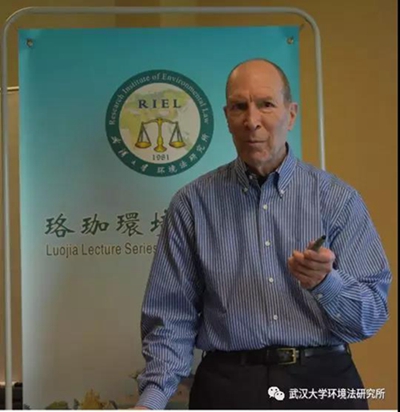Professor Sam Bleicher Gave a Lecture at Luojia Environmental Law Forum
On the afternoon of April 25, 2018, the 69th lecture of the Luojia Environmental Law Forum began in 446 classrooms in law school. This forum has the honour of inviting the Professor who visited, the Vice-chairman of the American Virginia State Air Pollution Control Committee, and Professor Sam Bleicher of Georgetown University Law School, on the theme "Global Climate change: Science, Economics and Law". This session was chaired by Professor Zhang Zhiwei (Alexander Zahar), and he attended the lecture in part by my doctoral and master students.

At the beginning of the lecture, Professor Zhang Zhiwei offered a brief introduction to Professor Sam Bleicher, who thanked Professor Sam Bleicher for his invitation to the Luojia Environmental Law Forum.

Sam Bleicher pointed out that climate change is a common problem facing the whole world and needs to be considered from many perspectives. First, Professor Sam Bleicher gave a scientific perspective on the causes of climate change. In his view, climate is determined by the balance between factors, and over the past 250 years, humans have been using coal, oil, natural gas and other compounds as fuel, and the extraction and combustion of these fuels have released large amounts of greenhouse gases, gradually breaking the original equilibrium. For the harm of greenhouse gases, Professor Sam Bleicher offered a comparative analysis of carbon dioxide and other greenhouse gases from the perspective of global warming potential (GWP), taking 100 years as a time cycle.
Next, Professor Sam Bleicher examined the predictions of future climate conditions. He cited the United Nations Intergovernmental Panel on Climate Change (IPCC) for data analysis. According to the IPCC's current estimate, if humans continue to use large amounts of fossil fuel, by 2100, the Earth's average temperature will be 2.6 degrees Celsius to 4.8 degrees Celsius above pre-industrial levels. Based on this analysis, Professor Sam Bleicher that global warming will have nine adverse effects, leading to uncontrolled climate change risk, seriously affecting people's productive life.
Professor Bleicher stressed that increased emissions of methane and HCFCs could cause near-term disruptions that could be very damaging and perhaps irreversible.
Through the analysis of fossil fuel use, national population, national GDP, global coal, oil consumption distribution, national total emissions and per capita emissions, Professor Sam Bleicher pointed out that developing countries account for about 60% of greenhouse gas emissions per year and that cumulative greenhouse gas emissions are close to 50%.
Then Professor Sam Bleicher provided an international perspective on effective measures to combat climate change. He briefed the Paris Pact on the assessment system from the limits of global warming, the time frame for abandoning fossil fuels, the cost of climate change, the frequency of countries reassessing emissions reductions, the regulation of countries to achieve emission reduction targets, and the commitment of climate change to damage. He argued that regulatory requirements for reducing emissions can be considered from the point of view of establishing the best practicable control technology (BACT) standard and determining the allowable total emissions.
On economic measures, he noted that economic incentives could be revised from three aspects of the market system, economic theory, subsidies and taxes to achieve emissions reductions. In particular, he pointed out that the carbon tax is controversial because it does not directly control the number of greenhouse gas emissions, so its impact is uncertain.
Professor Sam Bleicher argued that the ideal approach is the "cap and trade" system, which combines the strengths of economic incentives and regulation in a more conceptually complex but more flexible system to achieve better results. It is undeniable, however, that the initial arrangements for the establishment and allocation of national quotas are politically challenging.
Finally, Professor Sam Bleicher provided a brief overview of the U.S. states' response to climate change. He discussed the California State of the cap-and-trade plan and the RGGI plan in the northeastern U.S. states, which set up a takes regional greenhouse gas program, to provide a detailed introduction to their respective systems.
Subsequently, Professor Zhang Zhiwei a brief summary and comment on the lecture content, and once again expressed his welcome and thanks to Professor Sam Bleicher.
The students presented their own questions about the U.S. Clean Energy Program, NGO participation and other related issues, Professor Sam Bleicher offered detailed answers. At the end of the lecture, Professor Zhang Zhiwei a certificate for Professor Sam Bleicher and thanked Sam Bleicher for participating in the 69th lecture on the "Luojia Environmental Law Forum".
The lecture was successfully concluded in a warm and relaxing atmosphere.
Professor Sam Bleicher graduated from Northwestern University, Harvard University Law School, is currently Virginia State Air Pollution Control Committee vice chairman, and Georgetown University Law School adjunct professor. Sam Bleicher, Professor began a career in law teaching at the University of Toledo University Law School and University of Virginia Law School. He then held senior government positions at the Ohio Environmental Protection Agency, the U.S. National Oceanic and Atmospheric Administration and the U.S. State Department. He has worked in Washington DC area law firms for 20 years, dealing with environmental legal matters and related federal and state legislation and management matters.
Mr. Bleicher has written a novel titled "The Plot to Cool the Planet." It is expected to be available in bookstores and Amazon in the form of paperback and electronic versions this fall.
The Luojia Environmental Law Forum (Luojia lecture Series on Environmental Law) is a series of academic lectures organized by the Research Institute of Environmental Law of Wuhan University. The forum, adhering to the tenet of "both legal and practical, authoritative and frontier", invites the authoritative and practical elites of environmental law in both inside and outside China to give a wonderful speech on the hot and difficult issues of environmental law.
